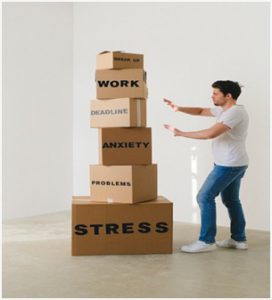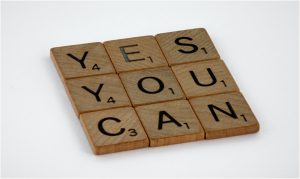
Stress and Anxiety before exams
Deep Breathing and other solutions to release Tension
Reasons for Anxiety:
It’s a basic tendency of human beings to fall prey to anxiety before a test. To get relief from anxiety, we need to do some relaxation exercises. Anxiety is a learned behavior. Test anxiety is a result of lack of control on your mind and heart which are very much required to be concentrated to take any test.

All Text: An image showing an activity which result in lack of control on mind and heart
Also, another reason for anxiety is to fall in tough tests as compared to your capability. Last one can be time constraints for tests as students may not want to leave the test center earlier than others after accomplishing the task.
Many synonyms of stress are anxiety, nervousness, strain, tension, trauma and so on. All related tends us towards failure. Not only in exams but in every trial of life.
In this article we will discuss few reasons of anxiety before tests and meditation as the best solution. Article was discussed with few persons to make sure that which method is best to excel in the examinations.

Let’s discuss reasons of being in stress prior to the exams. A few potential causes of test anxiety include:
Fear of Failure: If you connect your sense of self-worth to your test scores, the pressure you put on yourself can cause severe test anxiety.
When stress level is more than our mind and the heart will bear the weight. Load of work deadlines make it more stressful when time is not managed. Here comes the fear of failure. Solutions are that we must start dividing our time into seconds and think about utilizing or wasting even seconds especially prior to examination.
All Text: Stress enhances Fear of Failure

Poor Testing History: If you have done poorly on tests before, either because you didn’t study well enough or because you were so anxious, you couldn’t remember the answers, this can cause even more anxiety and a negative attitude every time you must take another test.
It is often considered that passing test in one go is always comfortable. Repeatedly, appearing for test creates nervousness as it carries along the fear legacy of last attempts.
All Text: Tense when poor results

Unpreparedness: If you didn’t study or didn’t study well enough, this can add to your feeling of anxiety. Continuous touch with books or syllabus is a real technique towards success.
First day, learn page one to ten, second day learn page eleven to eighteen but also revise 1-10. Third day revise 1-18 and then proceed ahead. This method will keep you in touch with the whole syllabus while moving ahead for success.
All Text: A student wanders when unprepared
Techniques to Overcome Anxiety Before Examinations
- Saying ‘No’ to Negative Self-Talk- Negative self-talk causes students to lose confidence and to give up on tests. Students need to change their negative self-talk to positive self-talk without making unrealistic statements

All Text: A Board showing positive attitude that YES YOU CAN
2. Say Yes to Positive Self-Talk During tests- Positive self-talk can build confidence and decrease your test anxiety. Using positive self-talk before a test also can help reduce test anxiety and improve your child’s grades.
Examples of positive self-talk may be: I may have failed the course last semester, but I now I have the study skills to pass, I went blank on the last test, but I now know how to reduce test anxiety, I know that with hard work, I will become a better writer, I prepared for this test and will do the best I can, I feel good about myself and my abilities. I am not going to worry about that one difficult problem. I’m going to use all my test time and check for careless errors. Even if I don’t get the grade I want on this test, it is not the end of the world.

- Deep Breathing
Advantages
- Decreases stress, increases calm: When you become strained or anxious, your brain releases cortisol, the “stress hormone.” By taking deep breaths, your heart rate slows, more oxygen enters our blood stream and ultimately communicates with the brain to relax. Deep breathing also ups your endorphins, the “feel good” chemical.
- Increases energy: The more oxygen that is in the blood, the better our body functions. It also improves our stamina.
- Helps support correct posture: Next time you breathe in, notice that you simultaneously lengthen and straighten your spine. To take a deep breath in, your lungs take up maximum space, your diaphragm pulls down, so in turn your torso straightens for this to be possible.
All Text: Inhaling fresh air in outdoors
Disadvantages
- The possible side effects of deep breathing are light-headedness, altered sensations, and fatigue if done incorrectly, somehow.
- When trying to relax, it’s crucial to not hold your breath for too long because your brain will become alert if your oxygen levels suddenly drop.
4. The Releasing Tension Method:
- Placing your feet firmly on the ground.Grab the chair’s base with your hands.
For roughly five seconds, simultaneously press your feet down and lift your chair.
- Take a few seconds to unwind. Repeat the process two or three times, and then relax every muscle in your body aside from the ones that are utilized to take the test.
Advantages
- Softens the tenseness of the test; Anxiety can make you overthink about anything on the test, making you less relaxed about taking it. By using the method to release it, it has a chance to help with taking your test while keeping your composure intact.
- Assists with the distraction of your own body:The tension of your body may be your own worst enemy in terms of focusing on your test. With a tenseless body, comes a tenseless mind.
Disadvantages
- Recent studies demonstrated relaxation techniques can have negative side effects for example it can increase anxiety, generate intrusive thoughts or fear of losing control.
- In case the person is practicing self-meditation or relaxation, this method requires a strong deep concentration and mindfulness which can generate more stress if the person can’t reach that point due to fear of failure.
- It is not recommended to people who experience mental illnesses. For example people with schizophrenia find closing their eyes extremely stressful, even torturing. It is recommended to consult a therapist before performing a relaxation technique. It is always wise to check on the student background to be safe about side effects about relaxation techniques.
Reflections
In general, the techniques of relaxation and meditation are good for most students. Recently, awareness of inner thoughts and mental health / illnesses has been more widely adopted. So, it is not uncommon for youth, in this case students, to adopt and feel comfortable with relaxation techniques that include being more aware of their emotions and feelings. Personally, deep breathing and positive thoughts help a lot when taking an exam or doing a homework assignment.

Irvinder Ahluwalia’s Reflection
All Text: Writer is a journalist
It’s a human habit of being nervous before tests. To avoid tense situations or bad aftereffects we always try to coop the situations. It’s best to do it prior to the test. Best method for me to get rid of anxiety is meditation and listening to nice old melodies. There are many other techniques which can be used by other students according to their tastes and lifestyle.



